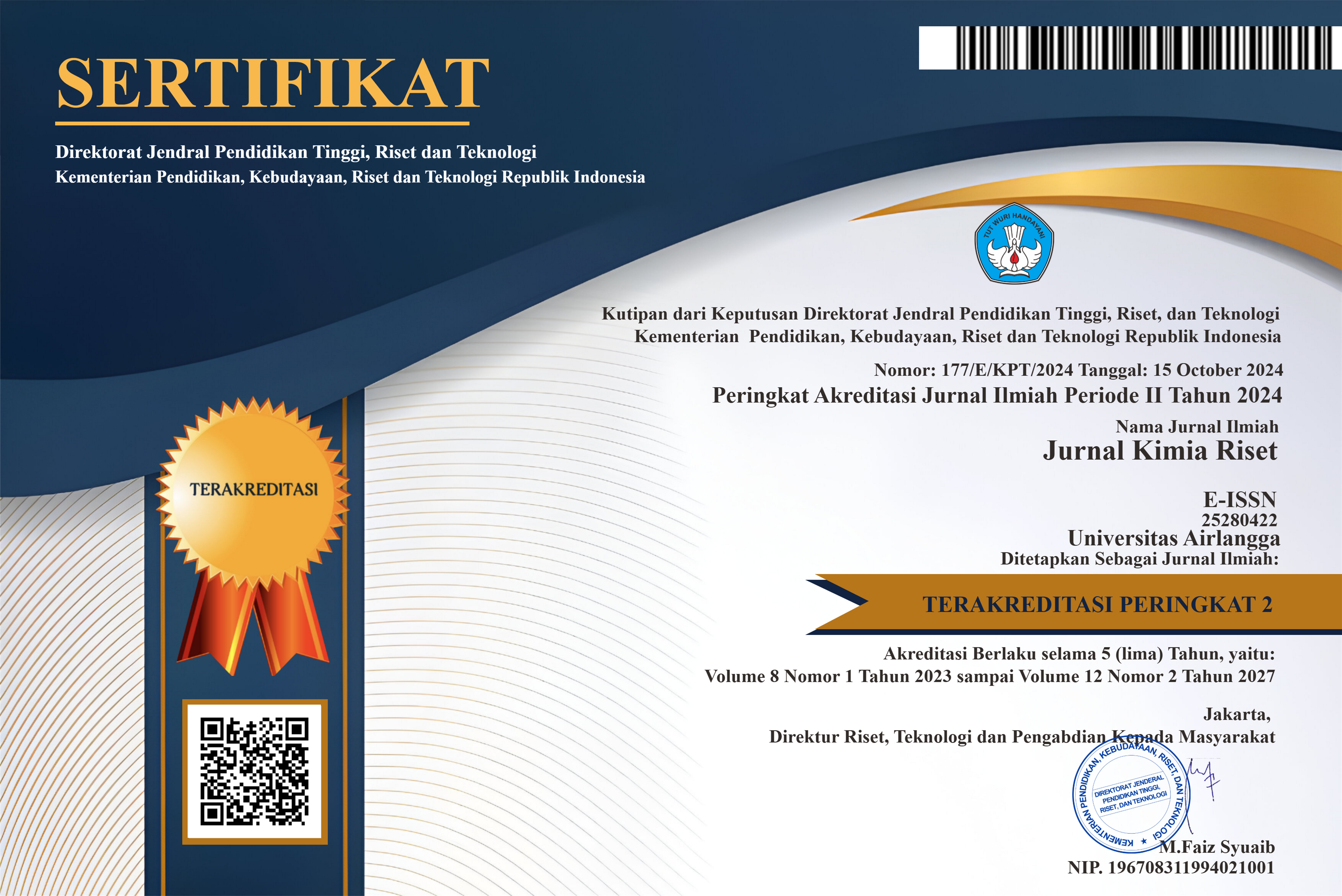THE EFFECT OF SULFURIC ACID AND Averrhoa bilimbi EXTRACT AS CATALYSTS ON FURFURAL YIELD FROM CORN COBS IN THE HYDROLYSIS PROCESS USING MICROWAVE
Downloads
Furfural is a selective solvent for petroleum that can produce high-quality diesel fuel. Generally, furfural research uses raw materials from corn cobs, but most still use inorganic acid catalysts. Therefore, researchers are trying to find alternative catalysts using environmentally friendly organic acids from Averrhoa bilimbi extract. This research aims to determine the effect of the concentration of sulfuric acid catalyst and Averrhoa bilimbi extract in the hydrolysis process on the quality and yield of furfural and the impact of using microwave heating on the quality and yield of furfural produced. The method used to make furfural is hydrolyzing corn cobs using a microwave heater (400 Watt power) with various sulfuric acid catalyst concentrations (10%, 15%, and 20%) and Averrhoa bilimbi. Observe the number of yields at each time interval of 60, 75, and 90 minutes. The resulting furfural is then analyzed to calculate the yield of each sample and identify furfural compounds using Gas Chromatography-Mass Spectrometry (GCMS). The research results showed that the best furfural yield at a catalyst concentration of 10% H2SO4 with a time of 90 minutes was 14.9632%. In GCMS analysis, the compound peaked on gas chromatography at a retention time of 2.208 with a relative molecular mass of 83.
Adebayo, A.J., Ogunjobi, J.K., Oluwasina, O.O. and Lajide, L., 2023. Comparative Production and Optimisation of Furfural and Furfuryl Alcohol from Agricultural Wastes. Chemistry Africa, 6(5), pp.2401–2417.
Adhiksana, A., Fitri, A.C.K., Siniwi, V.K.L. and Fitri, M.A., 2022. Effect of Catalysts H2SO4 8% and Baggase Ratio on Yield of Furfural with Hydrolysis Method Using Microwaves. Jurnal Teknik Kimia dan Lingkungan, 6(1), pp.84–90.
Alhassan, Alhassan Muhammad, and Q.U.A., 2016. Averrhoa bilimbi Linn.: A review of its ethnomedicinal uses, phytochemistry, and pharmacology. Journal of pharmacy & bioallied sciences, 8(4), pp.265–271.
Andaka, G., 2011. Hidrolisis Ampas Tebu Menjadi Furfural dengan Katalisator Asam Sulfat. Jurnal Teknologi, 4(2), pp.180–188.
Antonetti, C., Bonari, E., Licursi, D., Nassi o Di Nasso, N. and Raspolli Galletti, A.M., 2015. Hydrothermal Conversion of Giant Reed to Furfural and Levulinic Acid: Optimization of the Process under Microwave Irradiation and Investigation of Distinctive Agronomic Parameters. Molecules, 20(12), pp.21232–21253.
Cai, C.M., Zhang, T., Kumar, R. and Wyman, C.E., 2014. Integrated furfural production as a renewable fuel and chemical platform from lignocellulosic biomass. Journal of Chemical Technology & Biotechnology, 89(1), pp.2–10.
Cousin, E., Namhaed, K., Pérès, Y., Cognet, P., Delmas, M., Hermansyah, H., Gozan, M., Alaba, P.A. and Aroua, M.K., 2022. Towards efficient and greener processes for furfural production from biomass: A review of the recent trends. Science of The Total Environment, 847, p.157599.
Dunlop, A.P., 1948. Furfural Formation and Behavior. Industrial & Engineering Chemistry, 40(2), pp.204–209.
Eller, P.M. and Cassinelli, M.E., 1994. NIOSH Manual of Analytical Methods, Diane Publishing.
Fernández Sainz, Y., Raw, S.A. and Taylor, R.J.K., 2005. Improved Methodologies for the Preparation of Highly Substituted Pyridines. The Journal of Organic Chemistry, 70(24), pp.10086–10095.
Hapsari, Yolanda Mardiana, and C.S., 2022. Studi Literatur : Potensi Produksi Furfural dari Proses Hidrolisis dan Dehidrasi Senyawa Pentosan pada Limbah Tempurung Kelapa. DISTILAT: Jurnal Teknologi Separasi, 9(3), pp.190–199.
Hidajati, N., 2006. Pengolahan tongkol jagung sebagai bahan pembuatan furfural. Jurnal Ilmu Dasar, 8(1), pp.45–53.
Listiani, N., Iryani, D.A. and Rustamaji, H., 2016. Hidrolisis Ampas Tebu dengan Katalisator Asam Asetat untuk Memproduksi Furfural menggunakan Metode Steam Stripping. Jurnal Rekayasa Kimia & Lingkungan, 11(2), pp.53–60.
Mirnandaulia, M., 2017. Pembuatan Furfural dari Sembung Rambat (Mikania Micrantha) dengan Menggunakan Asam Organik dari Belimbing Wuluh (averrhoa blimbi). Universitas Sumatera Utara.
Mitarlis, M., Ismono, I. and Tukiran, T., 2011. Pengembangan Metode Sintesis Furfural Berbahan Dasar Campuran Limbah Pertanian Dalam Rangka Mewujudkan Prinsip Green Chemistry (Development Of Synthesis Method Of Furfural From Compost Heap Mixture To Reach Out Green Chemistry Principles). Journal of People and Environment, 18(3), pp.191–199.
Möller, M. and Schröder, U., 2013. Hydrothermal production of furfural from xylose and xylan as model compounds for hemicelluloses. RSC Advances, 3(44), pp.22253–22260.
Patil, B.M., Shinde, S.K., Jagdale, A.A., Jadhav, S.D. and Patil, S.S., 2021. Fruit Extract of Averrhoa bilimbi: A Green Neoteric Micellar Medium for Isoxazole and Biginelli-Like Synthesis. Research on Chemical Intermediates, 47(10), pp.4369–4398.
Patil, Bhagyashree, Mali, S., Patil, Bhimrao and Patil, S., 2020. Averrhoa bilimbi in Organic Transformation:A Highly Efficient and Green Biosurfactant for the Synthesis of Multi-Functional Chromenes and Xanthenes. Current Science, 118, p.931.
Rahim, M. and Nadir, M., 2015. Optimasi Waktu Hidrolisis Tandan Kosong Kelapa Sawit Menjadi Furfural Berbantukan Gelombang Mikro. Konversi, 4(2), pp.12–15.
Sánchez, C., Serrano, L., Andres, M.A. and Labidi, J., 2013. Furfural production from corn cobs autohydrolysis liquors by microwave technology. Industrial Crops and Products, 42, pp.513–519.
Setyadji, M., 2007. Hidrolisis pentosan menjadi furfural dengan katalisator asam sulfat untuk meningkatkan kualitas bahan bakar mesin diesel. Prosiding PPI - PDIPTN 2007. 2007 Pustek Akselerator dan Proses Bahan - BATAN, Yogyakarta.
Sievers, C., Musin, I., Marzialetti, T., Valenzuela Olarte, M.B., Agrawal, P.K. and Jones, C.W., 2009. Acid‐Catalyzed Conversion of Sugars and Furfurals in an Ionic‐Liquid Phase. ChemSusChem, 2(7), pp.665–671.
Suprapto, H.S. and Rasyid, M.S., 2002. Bertanam Jagung, Penebar Swadaya, Jakarta.
Thamizh Selvam, N., Santhi, P.S., Sanjayakumar, Y.R., Venugopalan, T.N., Vasanthakumar, K.G. and Swamy, G.K., 2015. Hepatoprotective activity of Averrhoa bilimbi fruit in acetaminophen induced hepatotoxicity in wistar albino rats. Journal of Chemical and Pharmaceutical Research, 7(1), pp.535–540.
Zhang, L., Yu, H., Wang, P., Dong, H. and Peng, X., 2013. Conversion of xylan, d-xylose and lignocellulosic biomass into furfural using AlCl3 as catalyst in ionic liquid. Bioresource Technology, 130, pp.110–116.
Zulnazri, Z., Purba, W.F. and Jalaluddin, J., 2021. Hidrolisis Furfural Dari Tongkol Jagung Dengan Katalisator Asam Asetat. Jurnal Teknologi Kimia Unimal, 10(2), p.37.
Copyright (c) 2024 Jurnal Kimia Riset

This work is licensed under a Creative Commons Attribution-NonCommercial-ShareAlike 4.0 International License.
COPYRIGHT NOTICE
1. By submitting the article to Jurnal Kimia Riset (JKR), the author has agreed to transfer some of the copyrights to the publisher of the research chemistry journal, Universitas Airlangga, indicated in the Copyright Transfer Agreement.
2. Authors still retain significant rights to use and share their own published articles for non-commercial purposes subject to Creative Commons Attribution-NonComercial 4.0 International License
3. All publications (printed/electronic) are open access for educational purposes, research, library, and other non-commercial purposes. Besides the purposes mentioned above, the editorial board is not responsible for copyright violations.















